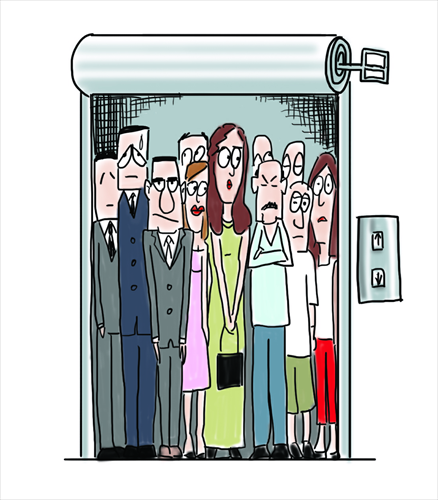Gaming the system ends up breaking it

Illustration: Liu Rui /GT
A US friend of mine recently posted an interesting analysis of behavior in McDonalds in Tianjin. Several downtown branches briefly initiated a new system, where customers ordered at the cashier counter, took a ticket, and had to wait to the side, in front of a pick-up counter, waiting for their ticket number to come up on a screen.
The new system worked - for a time. Customers obeyed as staff asked them to keep clear of the pickup counter and wait for their order to be called. But after a few weeks of the new system operating as planned, customers effectively broke it by crowding round the pickup counter, impatient to get their order, to the point that they blocked other patrons from getting their orders in a timely manner, or even took the wrong food.
My friend then discussed how "the situation is actually a cooperation game with two easily identifiable equilibria: (1) the Pareto optimal equilibrium desired by McDonalds, which is all customers waiting across from the pickup counter and giving workers time and space to fulfill orders; and (2) the equilibrium customers at lunchtime have arrived at, a dominant "crowding strategy" with zero sum assumptions." So faced with two strategies, "wait-as-requested" or "crowd-the-counter," whether through impatience, group behavior, or fear of losing out, the better option has succumbed to one causing aggravation, harassed staff and mistakes.
This sort of thing, unfortunately, is one of the most recurring and frustrating aspects in life in China: the way that people will game any system to destruction. A system is any kind of social convention, where certain behaviors are known and expected. And if there are expectations of behavior, some people will try to use that to their advantage. But it doesn't work when everyone is trying to get ahead. Things fall apart.
I once worked on the top floor of a 16-storey building. At lunch time, the elevators would become crowded: Everyone seemed to have lunch at the same time. So people on the higher floors would enter the elevator when it was still going up, in case it was full when going down. People from lower and lower floors followed suit, so that by the time it got to the 10th floor, yet alone the 16th, it was always jam-packed, and unable to take any more passengers.
Or here's another example. To see a doctor at the hospital, you have to buy a ticket beforehand. But because everyone knows they will sell out early, you have to go as early as possible. So everyone lines up hours before the hospital even opens - and so the tickets, of course, sell out instantly. And this is before we even consider touts, or why appointment booking systems have only been introduced in a few limited places.
Or take how, when driving, everyone will weave in and out of lane, trying avidly to get ahead, making drivers behind them brake and thereby causing the traffic to choke up quicker than if everyone had simply stayed in lane. Or how, at some buffets, people seem to act as though the food is running out, thus causing everyone to panic and grab as much as they can, causing the food to run out. Even the stock market can be understood this way. Investors pile in on changes in share value rather than the bottom line, leading to arbitrary booms and busts.
For the most part I applaud the tenacity and ambition of the Chinese. So many people are striving to get ahead, to develop.
And in many situations, if people cooperate, it's a non-zero sum game - everyone benefits when the rules are followed. Elevators aren't full when they shouldn't be, roads run smoother, McDonalds gets orders out faster. But if everyone is battling to get ahead, the behaviors and expectations they should observe collapse.
When there's a finite amount of goods to go around, it is unpleasant to see people trampling down systems in their urge to grab something for themselves. Worse than that, it's just counterproductive. You're not gaining an advantage, but instead destroying the very methods that everyone is relying on. And that makes everyone worse off.
The author has been a freelance journalist in China since 2008. Follow him at @bucketoftongues. opinion@globaltimes.com.cn Follow us on Twitter @GTopinion